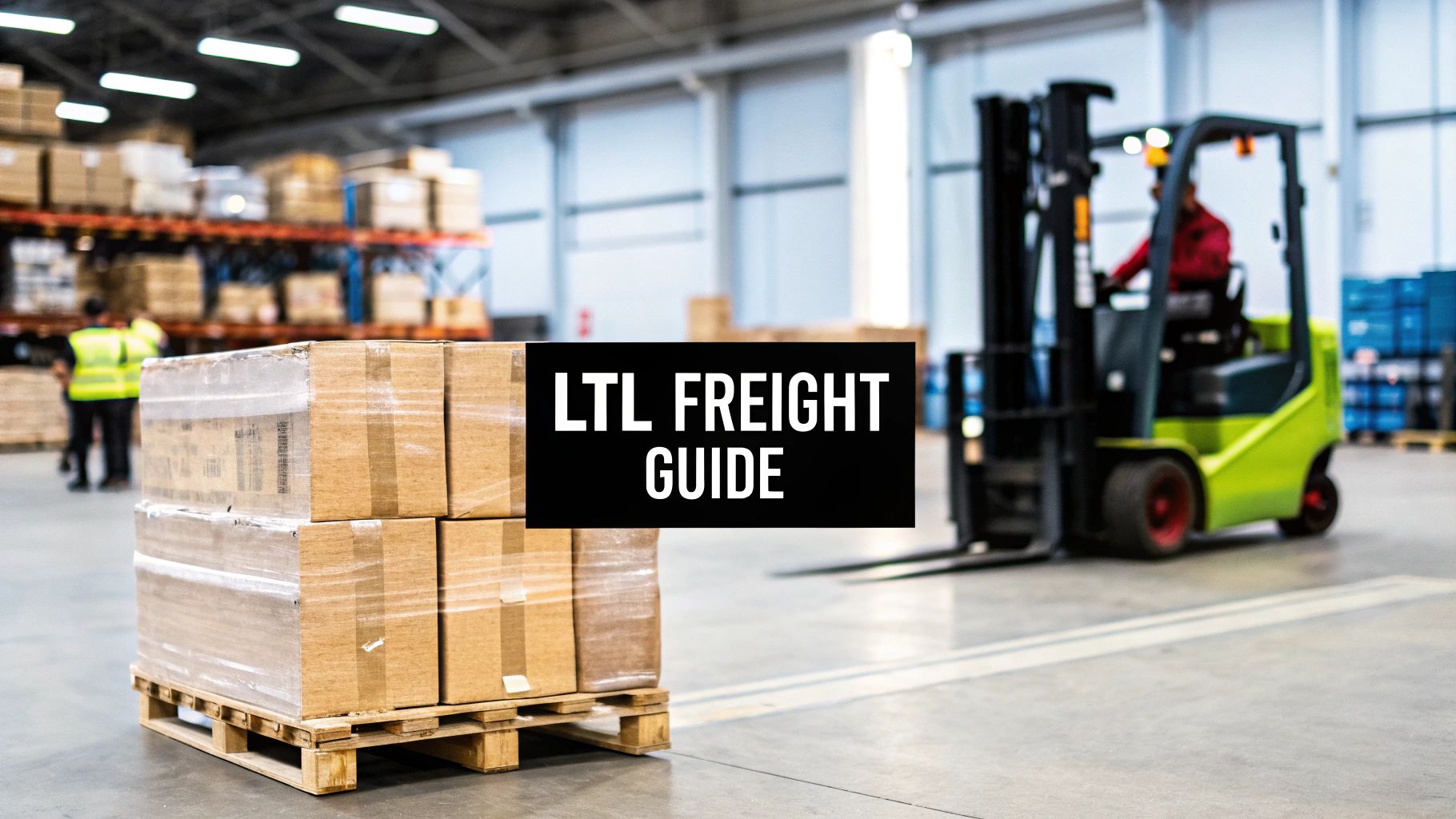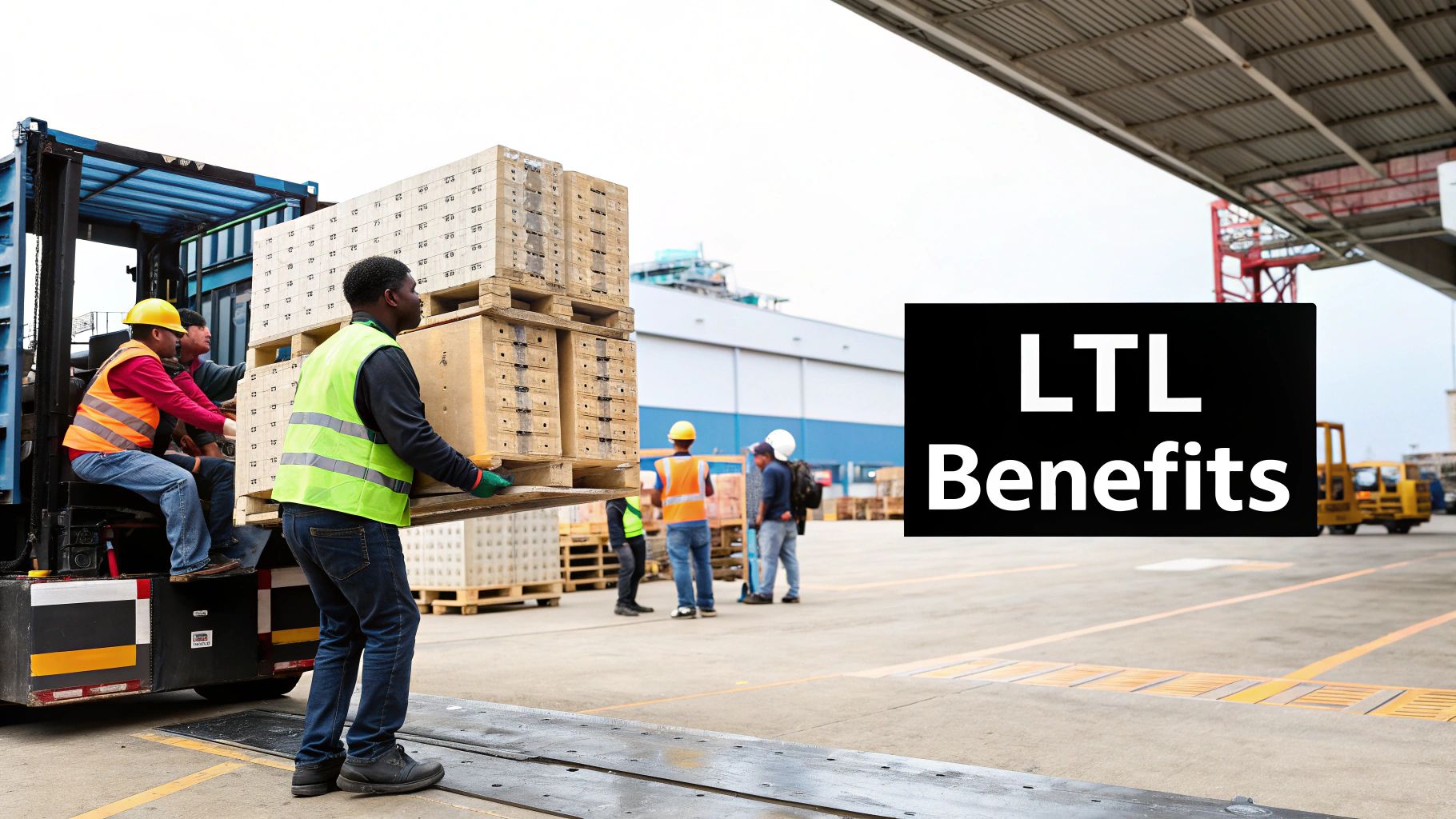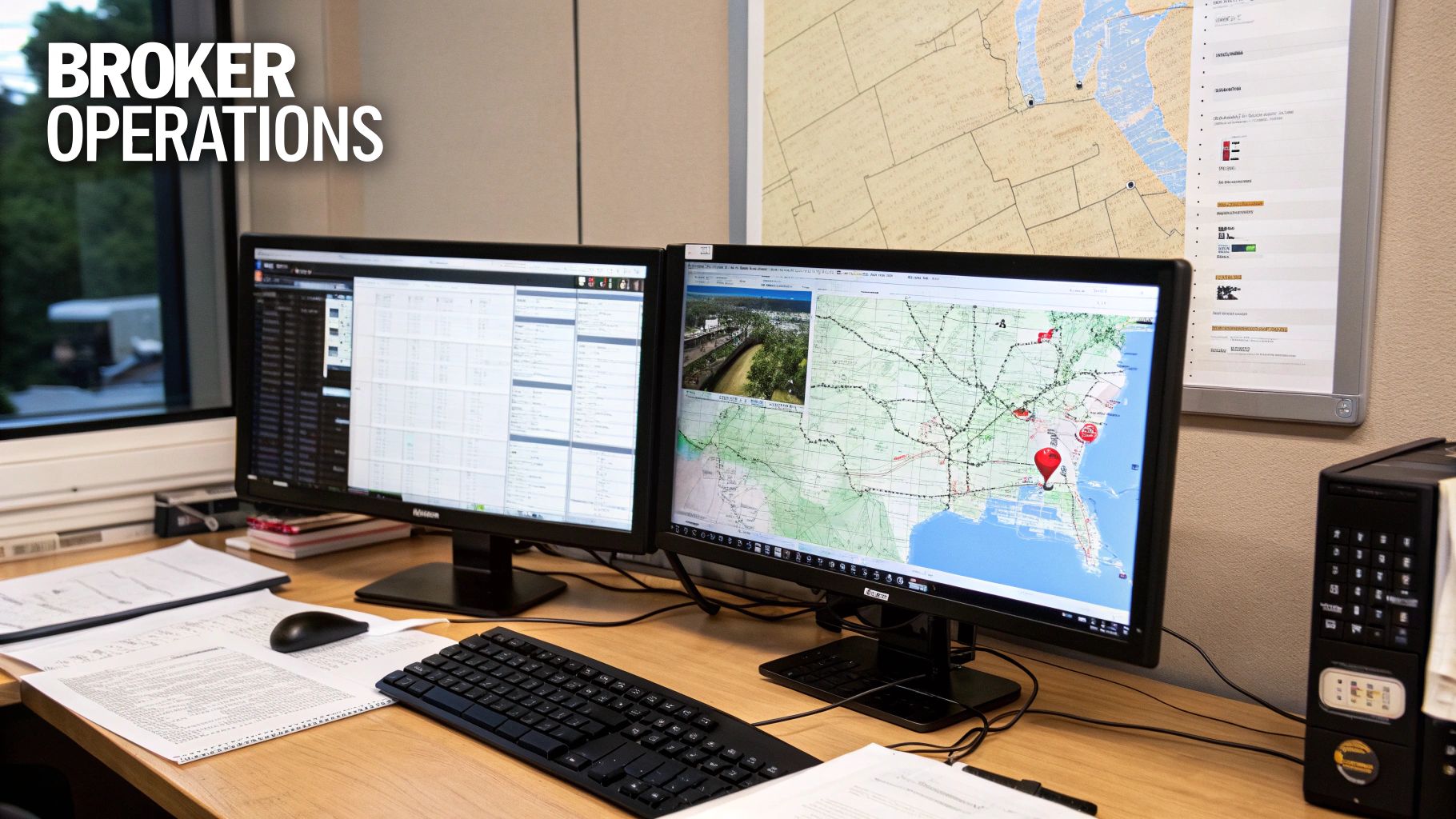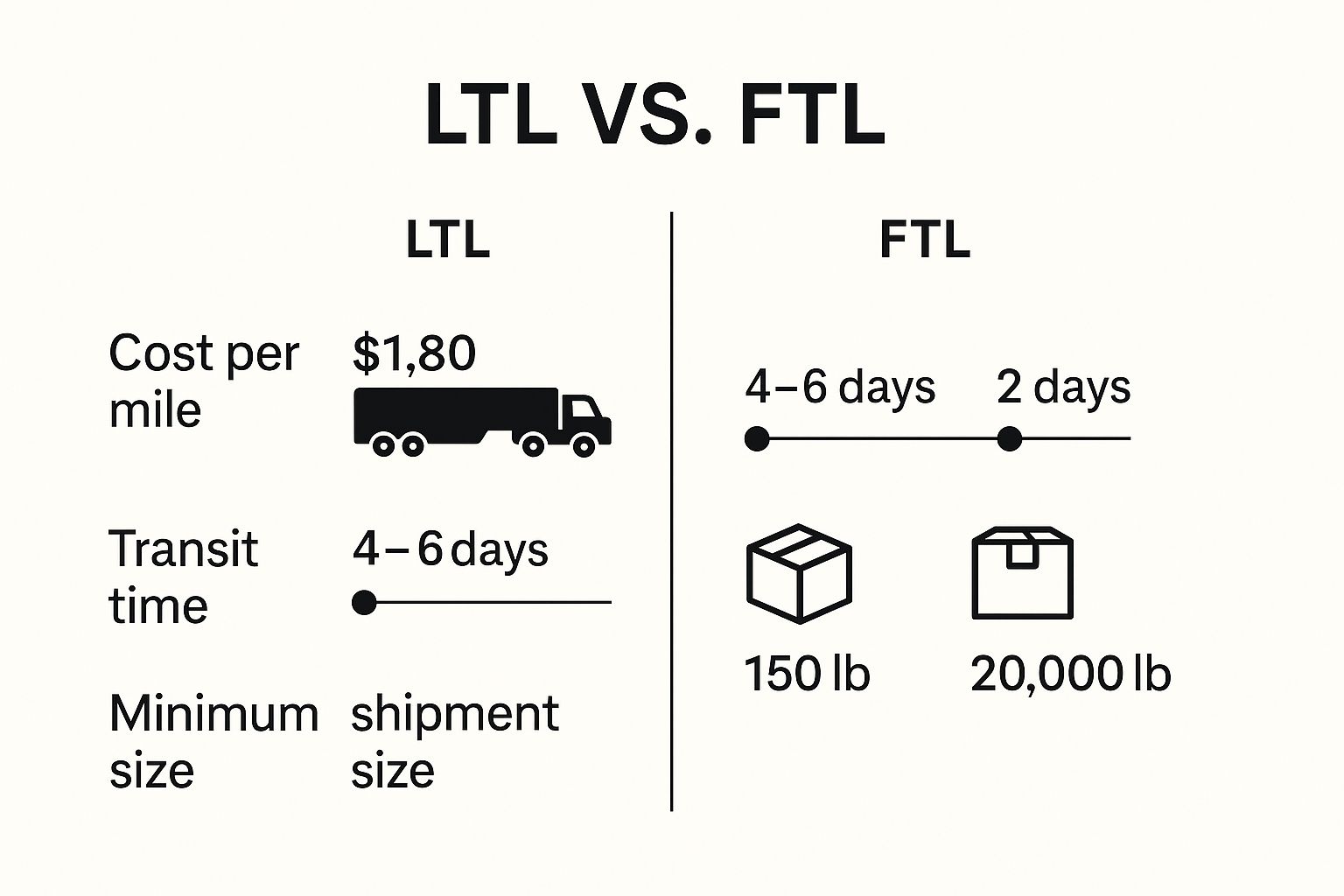
So, you have a few pallets to ship. Not enough to justify renting an entire truck, but too much for a standard parcel service. What do you do? This is precisely where an LTL freight brokerage steps in, acting as your logistics expert and saving you a major headache.
Shipping freight can feel like navigating a maze, especially when you're dealing with smaller quantities. This is the exact problem Less-than-Truckload (LTL) shipping was designed to solve. Instead of you footing the bill for a whole truck you can't fill, LTL lets your freight hitch a ride with other shipments, sharing the space and the cost.
Think of an LTL freight brokerage as a matchmaker for your cargo. They don't own the trucks or employ the drivers. Instead, they are seasoned logistics pros with a massive network of LTL carriers at their fingertips. Their entire job is to find the smartest, most budget-friendly path for your goods to travel. To see how much you could save, you can get a free instant freight quote for your FTL or LTL freight.
The LTL system operates a lot like a passenger airline's hub-and-spoke model, but for pallets and crates. Your shipment rarely, if ever, travels on a single truck from your dock to its final destination. It's a journey with a few planned stops.
This process is the secret sauce that makes LTL shipping so efficient for smaller loads. A good freight brokerage orchestrates this entire dance for you. They handle everything from generating the crucial Bill of Lading (BOL) to keeping an eye on your shipment as it moves between different trucks and terminals.
Before we go further, it helps to know the lingo. The world of LTL has its own unique vocabulary, and understanding these key terms will make the whole process much clearer.
Here's a quick-reference guide to some of the most common terms you'll encounter when working with an LTL broker.
Getting a handle on these terms puts you in a much better position to manage your LTL shipping effectively and avoid any surprise costs. See what your next shipment might cost by getting a free instant FTL or LTL freight quote.
The explosion of e-commerce has put immense pressure on supply chains, making flexible and intelligent shipping solutions non-negotiable. This is why the freight brokerage world is booming.
The U.S. freight brokerage market was valued around USD 19.68 billion in 2023, and it's on track to hit USD 28.17 billion by 2030. The LTL brokerage slice of that pie is a major contributor, growing at a healthy clip of about 9.0% each year. If you're curious, you can dive deeper into these market trends on Mordor Intelligence.
This isn't just a fleeting trend; it shows how vital LTL brokers have become to keeping modern commerce moving.
Ready to see how this powerful model can work for your business? Get a free, instant FTL or LTL freight quote today and discover a smarter way to ship.

You might be thinking, "Why not just go straight to the carrier?" It seems like the most direct route, right? But working with an LTL freight brokerage offers some serious strategic advantages that can save you a ton of time, money, and headaches.
Think of it this way: you could book a flight directly with one airline, or you could use an expert travel agent. The agent knows all the airlines, finds the best routes, uncovers hidden deals, and handles all the connections for you. An LTL broker does the exact same thing, but for your freight.
The biggest immediate benefit is their collective buying power. A broker isn't just booking one shipment; they're managing freight for hundreds, sometimes thousands, of businesses. This massive volume gives them incredible leverage to negotiate deeply discounted rates with carriers—prices that a single business shipping on its own could only dream of.
Curious what those savings look like? Get a free instant freight quote for your FTL or LTL shipment and see the difference for yourself.
Beyond the bottom-line savings, consider the sheer amount of time you spend just getting quotes. Chasing down different carriers, trying to make sense of their complicated pricing sheets, and then tracking shipments across a dozen different websites... it’s a full-time job. An LTL freight brokerage completely wipes that off your plate.
Your broker is your single point of contact for everything. They do all the legwork, find the best options for your specific shipment, and manage the entire journey from pickup to delivery. This frees you and your team up to focus on what actually grows your business.
By consolidating all shipping activities through one expert partner, businesses can reclaim countless hours previously lost to logistical coordination and administrative tasks. This efficiency gain is often as valuable as the direct cost savings on freight.
This streamlined approach means no more juggling multiple logins, phone calls, or tracking numbers. It's all managed through one simple, professional relationship. To experience this efficiency firsthand, get a free instant freight quote for your next FTL or LTL shipment.
When you work with a single carrier, you're stuck with their network, their capacity, and their service areas. That's it. An LTL freight brokerage smashes through those limitations, giving you instant access to a huge, pre-vetted network of hundreds of LTL carriers.
This opens up a world of possibilities:
The LTL world is full of tricky details and hidden "gotchas" that can lead to expensive mistakes. For instance, getting the freight classification wrong is one of the most common reasons for surprise charges on a shipping invoice. A good broker is your guide through this maze.
They make sure your freight is classified correctly from the start, that your Bill of Lading (BOL) is flawless, and that your pallets are packed properly to avoid costly re-bills and fines. And if something does go wrong—like a damaged or lost shipment—your broker handles the entire claims process for you. Anyone who's ever dealt with a freight claim knows how notoriously frustrating and time-consuming that can be. This expert oversight is truly invaluable.
Don't let logistics bog you down. Request a free, no-obligation FTL or LTL freight quote now and let our experts handle the details.

The Less-than-Truckload market is a living, breathing thing. It's constantly changing based on the economy, how much truck space is available, and what rates are doing day-to-day. If you want to keep your supply chain humming and your budget in check, you’ve got to understand these currents. This is where an experienced LTL freight brokerage becomes your secret weapon, helping you see what’s coming and adjust before it hits.
One of the biggest waves you'll face are General Rate Increases, or GRIs. Think of these as the annual price bump LTL carriers roll out, almost always at the start of the year. They do this to cover their own rising costs for fuel, driver pay, and truck maintenance. While it's just business for them, a surprise GRI can feel like a gut punch to your shipping budget.
A good broker, however, can soften that blow. Because they move so much freight for so many companies, they have the clout to negotiate contracts that protect you from the full impact of a GRI. The result? More stable, predictable pricing that you can actually plan around.
Don't wait for market shifts to put you on the defensive. Get your free, instant FTL or LTL freight quote today and see what a stable rate can do for your business.
The LTL world is in a constant state of adjustment, and right now is no different. Data shows that 2024 and 2025 are big years for pricing strategy. Even when shipment numbers dip slightly, the major carriers aren't shy about implementing GRIs.
We've seen top-tier carriers like FedEx Freight and UPS roll out increases around 5.9%, while some others have pushed rates up by as much as 7.9%. They're betting on future volume growth and need to cover today's higher operating costs. You can get a deeper dive into these numbers and what they mean for shippers in this detailed 2025 LTL market analysis.
So, how do you handle these inevitable hikes? You get proactive. An LTL freight brokerage gives you an edge by:
This kind of expert oversight means you stop reacting to price hikes and start managing them strategically.
Another huge factor changing the game is carrier consolidation. When big LTL carriers buy up smaller ones, it can reduce your options and sometimes affect service quality. On top of that, you have massive retailers stepping into the logistics arena themselves, which could shake up everything from carrier relationships to pricing.
As industry giants like Amazon and Walmart expand their own logistics operations, they introduce new competitive pressures and technological expectations. This shift forces traditional carriers and brokers to adapt, creating both challenges and opportunities for shippers who know how to navigate the changing landscape.
Your LTL freight brokerage is your guide through these changes. They work with a wide variety of carriers—national, regional, and specialty—so they're never stuck with just one or two choices. If a merger disrupts your usual shipping lane, your broker has already vetted reliable alternatives to ensure your freight doesn't miss a beat.
By working with a knowledgeable brokerage, you turn market volatility from a risk into a real advantage. Let our experts help you build a more resilient shipping strategy. Request a free FTL or LTL freight quote now.
Picking the right LTL freight broker isn't about chasing the lowest price. It’s about finding a true partner for your supply chain. A great broker brings stability, deep industry knowledge, and reliability to the table. The wrong one? They can leave you with nothing but delays, blown budgets, and a whole lot of headaches.
Think of it like choosing a financial advisor. You wouldn't just hand your life savings to the person with the slickest sales pitch. You'd dig into their track record, get a feel for their strategy, and make sure you trust them completely. The same level of care is essential when you're deciding who will manage your freight.
This is more important than ever as technology continues to shape the logistics world. The global LTL market is projected to skyrocket by an incredible USD 110.7 billion between 2025 and 2029, largely thanks to e-commerce and the rise of digital freight tools. Brokers who have embraced modern platforms are simply better positioned to offer great pricing and service. You can learn more about these LTL freight market trends and the tech behind them to see what's coming.
Ready to find a partner who will help you win? Get a free instant freight quote for FTL or LTL freight and see what a difference the right broker can make.
First things first: pop the hood on their carrier network. A broker with only a handful of carrier relationships is like a travel agent who only books flights on one airline—your options for routes and prices will be seriously limited. A deep, diverse network gives you the flexibility and capacity you need, especially when things get busy or you’re shipping on a tough lane.
When you're talking to potential brokers, here are a few questions you should definitely ask:
Ultimately, a strong network is your safety net. It’s what keeps your freight moving smoothly, even when disruptions happen.
In today's logistics game, a powerful Transportation Management System (or TMS) isn't just a nice-to-have; it's essential. This is the digital command center you'll use to get quotes, book loads, and track your shipments. A clunky, hard-to-use system will only create friction and waste your time.
A broker's TMS is a window into their soul. If their tech is a pain to use, it's a giant red flag that their service will be just as complicated.
Look for a TMS from a platform like Turvo that gives you instant, side-by-side rate comparisons, real-time tracking, and one-click access to all your documents, like the Bill of Lading (BOL). This is also where you can easily compare different freight modes to see what makes the most sense for your budget and timeline.
This graphic breaks down the fundamental differences between LTL and FTL shipping—it’s all about a trade-off between cost, time, and shipment size.

As you can see, LTL is your go-to for cost savings on smaller shipments, while FTL offers the speed of a dedicated, non-stop journey.
To help you organize your thoughts and compare brokers apples-to-apples, use this simple checklist. It will help you focus on what really matters beyond just the price tag.
Broker Evaluation Checklist
Finally, what happens when things go wrong? Because in logistics, they sometimes do. You need to know who you’re going to call. The best brokers give you a dedicated point of contact who actually understands your business and can jump on problems right away. If their only support option is a generic 1-800 number, you should probably keep looking.
Also, be sure to ask about their claims process. A top-tier LTL freight brokerage will handle the entire claims headache on your behalf, which can save you an incredible amount of time and stress. Look for a team that is transparent, responsive, and acts like a true partner, not just another vendor.
Don't settle for service that just gets the job done. Start your search with confidence by requesting a no-obligation LTL or FTL freight quote from us.

LTL shipping is a brilliant way to manage costs, but it’s also riddled with little traps that can lead to surprise fees, maddening delays, and damaged freight. To really make LTL work for you, you have to know what pitfalls to look out for. Think of an expert LTL freight brokerage as your guide—they've seen it all and can help you sidestep these common (and costly) errors right from the start.
Honestly, the most frequent and expensive mistake we see is getting the freight class wrong. You can do everything else perfectly, but if that National Motor Freight Classification (NMFC) number is off, you’re almost guaranteed to get a billing adjustment from the carrier. And these aren't just polite corrections; they usually come with hefty administrative fees that turn a budget-friendly shipment into a real headache.
Let's walk through the most common slip-ups so you can keep your shipments on time, on budget, and in one piece.
Don’t let simple mistakes inflate your shipping costs. Get a free instant freight quote for your FTL or LTL shipment and let our experts ensure every detail is correct.
The single biggest source of billing surprises in LTL shipping is, without a doubt, incorrect freight classification. Every single item shipped via LTL needs an NMFC number. This system groups products into one of 18 classes (from a low of 50 to a high of 500) based on four things: density, stowability, handling, and liability.
A low class, like 50 for a pallet of dense steel bolts, is cheap to ship. A high class, like 500 for a pallet of feather-light ping pong balls, is expensive. Guessing the class or just reusing an old one for a new product is a recipe for disaster. Carriers are pros at spotting these mistakes. They’ll reweigh, remeasure, and reclassify your freight at their terminal, and you'll get a rebill for the difference plus a penalty fee.
An LTL freight brokerage takes the guesswork out of the equation. They use specialized tools and, more importantly, years of experience with the NMFC system to nail the right class every time. This protects you from those nasty, unexpected charges and makes sure your initial quote is the price you actually pay.
Coming in a very close second to misclassification is reporting the wrong weight and dimensions. LTL carriers plan their entire truckload based on the numbers you give them. If you claim your pallet is 500 pounds but it actually tips the scales at 750, you’ve just thrown a wrench in their whole operation.
Carriers have sophisticated systems like dimensioners and in-ground scales at their terminals to verify every pallet. When they catch a discrepancy—and they will—they issue a rebill. These "small" inaccuracies can easily add up to thousands of dollars over time and completely wreck your shipping budget.
Here’s the golden rule: always measure and weigh your freight after it’s been fully packaged, shrink-wrapped, and put on the pallet. Those final numbers are the only ones that count.
In the world of LTL, your freight is going on a bit of an adventure. It gets handled a lot. A forklift moves it at the origin terminal, it's loaded onto a long-haul truck, unloaded at a transfer hub, and then loaded onto a final delivery truck. Your packaging has to be tough enough to survive the journey.
We see the same packaging mistakes over and over:
When your freight gets damaged, it often leads to denied claims and lost revenue. A good broker can give you practical packaging advice to make sure your goods arrive looking as good as when they left.
The Bill of Lading (BOL) is the most important document for your shipment. It's the contract, the receipt, and the instruction manual all rolled into one. If it's incomplete or has errors, it can cause major headaches, from the driver refusing the pickup entirely to your freight getting lost somewhere in the carrier's network.
Your BOL has to be perfect. Every detail—addresses, contact info, the exact commodity description, weight, class, and any special services like a liftgate—must be correct. This is where your LTL freight brokerage really shines; they handle the critical task of creating a flawless BOL for you, ensuring a smooth handoff to the carrier.
Avoid these pitfalls and make your next shipment seamless. Get an expert-backed FTL or LTL freight quote now and ship with confidence.
Diving into LTL shipping can feel like learning a new language. Whether you're just starting out or trying to fine-tune your logistics, you've probably got questions. We get it. Let's clear things up by tackling some of the most common questions we hear about LTL freight brokerage.
Feeling ready to see how it works? Get a free instant freight quote for your FTL or LTL shipment and let our team show you the ropes.
This is a big one, and it's easy to get them mixed up. The simplest way to think about it is like this: a carrier is the airline that owns the planes, while a broker is the expert travel agent who finds the perfect flight for you.
An asset-based carrier, like FedEx Freight or Old Dominion, owns its own fleet of trucks, trailers, and a network of terminals. When you work directly with them, you’re locked into their system and their equipment.
An LTL freight brokerage, on the other hand, doesn’t own any trucks. Instead, we build powerful relationships with hundreds of different carriers. Our job is to be your dedicated logistics partner, matching your specific shipment with the ideal carrier based on the route, your budget, and any special handling it needs. This gives you incredible flexibility, a single point of contact for every shipment, and access to volume-discounted rates you simply can't get on your own.
LTL pricing isn't as simple as just weight and distance—it's more like a puzzle with several key pieces. Getting a handle on these factors is the first step to controlling your costs.
Here’s what goes into the calculation:
A good LTL broker helps you navigate all these variables, ensuring you get a competitive rate that’s accurate from the start.
The Bill of Lading (BOL) is, without a doubt, the single most important document in your shipment's journey. It’s far more than just a piece of paper; it wears three very important hats.
First, it’s a receipt that proves the carrier has picked up your goods. Second, it's the official contract that lays out all the terms and conditions for the move. And third, it’s a document of title, which means it legally represents ownership of the cargo.
An accurate, complete, and easy-to-read Bill of Lading is your best protection against surprise billing adjustments, frustrating delays, and claim headaches. Everything from the addresses and freight class to the piece count and special instructions needs to be perfect.
This is one area where a broker is a lifesaver. We almost always generate the BOL for you, catching potential errors and preventing simple mistakes from turning into costly problems.
There are several smart, practical things you can do to lower your freight spend without compromising on service. Honestly, the single most effective move is to work with an LTL freight brokerage. The volume discounts we've negotiated with carriers give you an immediate price advantage.
Beyond that, here are a few best practices to focus on:
Talk to our logistics experts and see how these strategies can work for you. Get a free FTL or LTL freight quote to explore real cost-saving opportunities today.
Take control of your shipping budget and simplify your logistics with FreightQuotesNow. Our platform provides instant access to a network of over 50,000 vetted carriers, ensuring you get the best rate for every shipment. Stop wasting time chasing quotes and start saving money. Get your free instant freight quote now!
Article created using Outrank